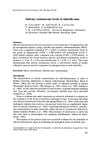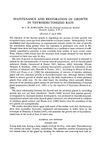 August 2020 in “Nigerian journal of paediatrics”
August 2020 in “Nigerian journal of paediatrics” A 24-month-old Nigerian girl developed early puberty with no family history, needing treatment her family couldn't afford.
 25 citations,
January 2013 in “International Journal of Trichology”
25 citations,
January 2013 in “International Journal of Trichology” Premature balding in some men may be linked to altered hormones, but it's not the male equivalent to polycystic ovary syndrome or metabolic syndrome.
5 citations,
March 2013 in “BMJ case reports” Gastric bypass surgery improved a woman's hormonal disorder without the need for medication.
 84 citations,
November 2003 in “European journal of endocrinology”
84 citations,
November 2003 in “European journal of endocrinology” Women with androgenic alopecia are more likely to have polycystic ovaries and higher androgen levels, which may indicate PCOS.
 47 citations,
August 2000 in “Endocrine Reviews”
47 citations,
August 2000 in “Endocrine Reviews” The document concludes that more research is needed to understand excessive hair growth in women with normal hormone levels and regular ovulation.
 5 citations,
August 1987 in “Andrology”
5 citations,
August 1987 in “Andrology” Men with low or no sperm count have lower salivary testosterone levels, and saliva testing can measure their testosterone well.
 97 citations,
July 2006 in “Dermatologic therapy”
97 citations,
July 2006 in “Dermatologic therapy” The document concludes that accurate diagnosis and personalized treatment are important for skin problems in women with PCOS.
 80 citations,
August 2002 in “Journal of Dermatology”
80 citations,
August 2002 in “Journal of Dermatology” Best hair growth results from combining finasteride and minoxidil.
 60 citations,
October 2014 in “Journal of the American Academy of Dermatology”
60 citations,
October 2014 in “Journal of the American Academy of Dermatology” Dermatologists play a key role in treating skin symptoms of PCOS like dark patches, excess hair, acne, and hair loss.
 54 citations,
April 2010 in “Baillière's best practice and research in clinical endocrinology and metabolism/Baillière's best practice & research. Clinical endocrinology & metabolism”
54 citations,
April 2010 in “Baillière's best practice and research in clinical endocrinology and metabolism/Baillière's best practice & research. Clinical endocrinology & metabolism” Impaired androgen production in 46,XY DSDs causes ambiguous genitalia and requires long-term care.
 9 citations,
July 2009 in “Journal Of Endocrinology, Metabolism And Diabetes Of South Africa”
9 citations,
July 2009 in “Journal Of Endocrinology, Metabolism And Diabetes Of South Africa” The document concludes that managing PCOS involves treating symptoms and reducing long-term metabolic risks, with lifestyle changes being important.
 48 citations,
February 2008 in “Nutrition in Clinical Practice”
48 citations,
February 2008 in “Nutrition in Clinical Practice” Dietary changes, including weight loss and a balanced diet, are important for managing PCOS, especially in overweight women.
 17 citations,
April 2010 in “Archives of Gynecology and Obstetrics”
17 citations,
April 2010 in “Archives of Gynecology and Obstetrics” Obese women had more testosterone and less acne, but similar hair growth compared to non-obese women.
 3 citations,
December 2011 in “Journal of Gynecologic Surgery”
3 citations,
December 2011 in “Journal of Gynecologic Surgery” Three to five ovarian punctures are best for improving fertility in women with PCOS without harming the ovaries.
 1 citations,
May 2011 in “Journal of Human Reproductive Sciences”
1 citations,
May 2011 in “Journal of Human Reproductive Sciences” Finasteride may decrease semen quality but not harm sperm production, and stopping the drug can improve semen quality; hyperprolactinemia can cause infertility but is treatable with medication.
 36 citations,
May 2021 in “Nutrients”
36 citations,
May 2021 in “Nutrients” Natural molecules like inositols, resveratrol, vitamins, and omega-3 fatty acids may help manage Polycystic Ovary Syndrome (PCOS), but their effects vary and need more exploration.
 11 citations,
March 2021 in “Reproductive Biology and Endocrinology”
11 citations,
March 2021 in “Reproductive Biology and Endocrinology” Polycystic Ovary Syndrome (PCOS) symptoms vary globally, with bloating, high cholesterol, and glucose levels being common; the current diagnostic criteria may need refining.
 77 citations,
May 2012 in “Expert Opinion on Emerging Drugs”
77 citations,
May 2012 in “Expert Opinion on Emerging Drugs” New treatments for male hypogonadism are effective and should be personalized.
 7 citations,
August 2017 in “European Journal of Obstetrics & Gynecology and Reproductive Biology”
7 citations,
August 2017 in “European Journal of Obstetrics & Gynecology and Reproductive Biology” Lower vaspin levels in the blood may indicate a better response to fertility treatment in women with PCOS.
 5 citations,
August 2018 in “Sexual Medicine Reviews”
5 citations,
August 2018 in “Sexual Medicine Reviews” 5α-Reductase inhibitors do not consistently increase testosterone levels in the blood.
 93 citations,
June 2001 in “The Journal of Clinical Endocrinology and Metabolism”
93 citations,
June 2001 in “The Journal of Clinical Endocrinology and Metabolism” Certain genetic variations in the AR and ERβ genes can affect androgen levels in women.
 23 citations,
July 1989 in “Postgraduate medical journal”
23 citations,
July 1989 in “Postgraduate medical journal” Spironolactone did not make hair thinner in women with excess hair growth.
 8 citations,
March 1942 in “Journal of Endocrinology”
8 citations,
March 1942 in “Journal of Endocrinology” Thyroid hormone treatments help thyroidectomized rats grow normally.

Metformin helps manage weight, blood pressure, and hormonal imbalances in PCOS patients.
 131 citations,
August 2004 in “Best Practice & Research in Clinical Obstetrics & Gynaecology”
131 citations,
August 2004 in “Best Practice & Research in Clinical Obstetrics & Gynaecology” The conclusion is that PCOS is caused by ovarian sensitivity to hormones and disrupted hormone control, possibly due to ovarian factors, and more research is needed.
 88 citations,
May 2012 in “Human Reproduction Update”
88 citations,
May 2012 in “Human Reproduction Update” Women with PCOS may take longer to get pregnant but can have a normal family size, and should manage their overall health to reduce long-term health risks.
 7 citations,
July 2014 in “Reproductive Biomedicine Online”
7 citations,
July 2014 in “Reproductive Biomedicine Online” The length of CAG repeats in the androgen receptor gene is linked to ovarian reserve but does not affect how the ovaries respond to stimulation.
 1 citations,
January 2001 in “Drug and therapeutics bulletin”
1 citations,
January 2001 in “Drug and therapeutics bulletin” The document concludes that management strategies for PCOS are important due to its common occurrence and associated health risks.
 9 citations,
June 2002 in “Best Practice & Research in Clinical Obstetrics & Gynaecology”
9 citations,
June 2002 in “Best Practice & Research in Clinical Obstetrics & Gynaecology” Testosterone therapy can help women with androgen deficiency by improving energy, sex drive, and bone health with few side effects.
 36 citations,
November 1995 in “Clinical endocrinology”
36 citations,
November 1995 in “Clinical endocrinology” Low-dose flutamide helps reduce excessive hair growth and is even more effective with birth control, without bad effects on blood fats.





























